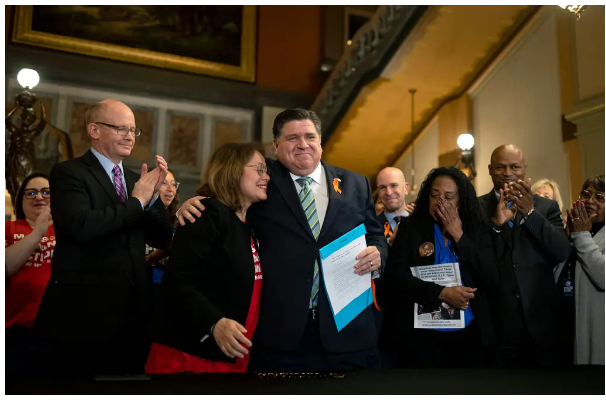CHICAGO — When Illinois legislators passed a far-reaching ban last week on selling certain high-powered guns and high-capacity magazines, the Democrats who run the state celebrated it as a lifesaving law that would help prevent mass violence. But on Friday, in the law’s first judicial test, a state judge in Effingham County temporarily blocked it from being enforced against hundreds of people and several gun dealers who sued.
That ruling, a preliminary step and one of several legal tests the law is likely to face, came amid broad uncertainty about whether sweeping gun controls like those in Illinois can withstand judicial scrutiny following a Supreme Court decision in a New York case last year.
Within days of Gov. J.B. Pritzker signing the Illinois legislation, at least three lawsuits were filed challenging it in state and federal courts. Though the case in Effingham County, a conservative area east of St. Louis, focused on claims that the law violated the Illinois Constitution, two other lawsuits, in Federal District Court in Southern Illinois and in state court in rural Crawford County, included Second Amendment arguments that invoked the Supreme Court’s New York ruling. The judge in Effingham County, Joshua Morrison, also mentioned the New York case in his ruling on Friday granting a temporary restraining order.
“The big picture is just a lot of uncertainty and a lot of unpredictability until there is agreement on some kind of way to apply” the ruling from last year’s Supreme Court case, said Andrew Willinger, the executive director of the Center for Firearms Law at Duke University.
In that case, New York State Rifle & Pistol Association v. Bruen, the court found that Americans have a broad right to arm themselves in public and struck down a New York law that placed strict limits on carrying guns outside the home. The decision, in which the court’s six conservative justices were in the majority and its three liberal justices dissented, has led to a wave of litigation and legislation nationwide. Judges and lawmakers have disagreed on how to apply the new precedent, and activists on all sides of the gun debate have strained to find where the new lines are.
Mr. Pritzker said the ruling on Friday was disappointing but “not surprising,” and expressed confidence that the law would ultimately be upheld. The office of Attorney General Kwame Raoul said it would appeal.
Even before its new weapon ban, Illinois had the most extensive gun restrictions in the Midwest, including a requirement that residents be licensed by the State Police to own firearms. But legislators were spurred to go further after a gunman killed seven people and wounded dozens of others with a high-powered rifle at a Fourth of July parade last year in Highland Park, a Chicago suburb that had been at the center of a court fight over its municipal ban on certain weapons.
The new state law, which took immediate effect, made Illinois one of nine states with some form of what advocates call an assault weapon ban, according to the Giffords Law Center, which supports gun restrictions. Under the new Illinois rules, a long list of specific types of semiautomatic weapons, including AR-15-style rifles, are no longer allowed to be sold to residents, and people who currently own them were given a deadline to register them with law enforcement.
Though supporters of the law acknowledged the limits of legislating weapon sales on a state-by-state basis — Illinois borders several states with loose gun laws, contributing to its long-running struggles with violence — they said the new legislation would still have an impact. Congressional Democrats have attempted to restore a national ban on assault weapons, but have been blocked by Republicans.
